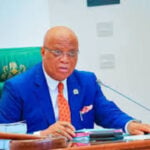The Executive Secretary of the National Human Rights Commission (NHRC), Dr. Tony Ojukwu, SAN has stressed the need for improved disaster preparedness and protection for Internally Displaced Persons (IDPs) in the country.
Ojukwu’s call followed the recent flood disaster in Mokwa in Niger state where over 200 people lost their lives and many remain missing.
The NHRC boss who spoke at the Commission’s monthly Human Rights Situation Dashboard, held on Tuesday in Abuja, the Commission announced the launch of a new quarterly Human Rights and Internal Displacement Dashboard—the first of its kind in Nigeria’s history —in response to the growing displacement crisis.
According to him, the initiative, developed in partnership with the United Nations High Commission for Refugees (UNHCR), will systematically track and address the challenges facing IDPs, asylum seekers, refugees, and returnees.
Between February and April, he said the Commission recorded over 40,000 displacement incidents and 1,460 rights complaints from the vulnerable groups and that, many continue to suffer from inadequate shelter, lack of healthcare, and systematic rights violations.
The Chief Human Right Officer of the Federation also raised alarm over the growing humanitarian and rights crisis in Nigeria, revealing that the Commission recorded over 275,256 complaints in the month of May alone.
Ojukwu noted that the overwhelming number of complaints was a clear indicator that, “too many Nigerians feel unprotected” and that the country risks normalizing distress and impunity.
In his words, “When over a quarter of a million people come to the National Human Rights Commission in just one month, the message is loud and clear.
The NHRC boss highlighted the wide range of rights violations witnessed in May, including violent attacks in the Northeast, sexual violence, and mass deaths from natural disasters.
Ojukwu announced that the Commission will go into partnership with Ability Live Initiative Allies, a civil society group focused on the rights of persons with disabilities.
He said, the partnership seeks to tackle deep-seated discrimination against the estimated 5 million Nigerians living with disabilities, who continue to face limited access to education, employment, and public services.
“This partnership aims to ensure that persons with disabilities are not merely included but are actively participating in societal and economic spheres,” Dr. Ojukwu said and urged government agencies, development partners, and civil society organizations to use the dashboards not only as data tools but as mechanisms to hold authorities accountable and improve human rights outcomes.
READ MORE FROM: NIGERIAN TRIBUNE
WATCH TOP VIDEOS FROM NIGERIAN TRIBUNE TV
- Let’s Talk About SELF-AWARENESS
- Is Your Confidence Mistaken for Pride? Let’s talk about it
- Is Etiquette About Perfection…Or Just Not Being Rude?
- Top Psychologist Reveal 3 Signs You’re Struggling With Imposter Syndrome
- Do You Pick Up Work-Related Calls at Midnight or Never? Let’s Talk About Boundaries







